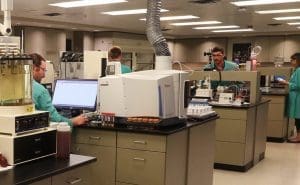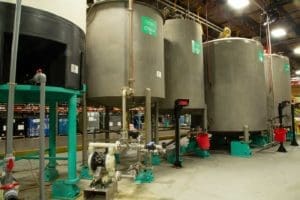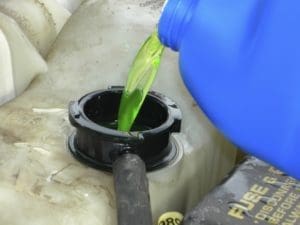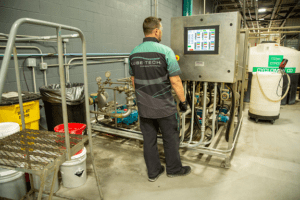 At Lube-Tech, our team of R&D chemists formulate some of the world’s most advanced, engineer-approved water-based fluids. Having developed over 7,000 custom products, including high-performance OEM fluids, we deliver solutions that maximize your equipment’s performance and life expectancy.
At Lube-Tech, our team of R&D chemists formulate some of the world’s most advanced, engineer-approved water-based fluids. Having developed over 7,000 custom products, including high-performance OEM fluids, we deliver solutions that maximize your equipment’s performance and life expectancy.
Water-based fluids are designed to protect hardworking engines and keep surfaces and equipment free from the negative effects of dirt and grime. The most common fluids are antifreeze and cleaners.
Antifreeze/Coolants
Antifreeze/Coolants are comprised of three primary ingredients: antifreeze, water, and dyes.
By definition, antifreeze is Ethylene Glycol (EG) and water. However, some are made from Propylene Glycol (PG). The main differences between EG and PG are the level of toxicity and the freeze point. Propylene Glycol has extremely low toxicity and is often found in cosmetics, personal care products, and other items that may come in contact with humans and other animals. Ethylene Glycol, on the other hand, is poisonous and must be handled with care to restrict human/animal exposure. Furthermore, EG is more thermally efficient at lower temperatures, requiring a higher concentration of PG to reach an equivalent freeze point.
Mixed in with the EG or PG are additives such as phosphates and silicates, which help prevent rust.
As a general rule of thumb, about 50% of an antifreeze/coolant mixture is water. In warmer climates, it may be 60% water; or, in extreme cold, it may only be 40% water, but a 50/50 ratio is most common.
Lastly, antifreeze/coolant is naturally clear. Color is added to signify either a brand or generally accepted type of coolant, but there is not an absolute standard or guideline. Fortunately, Lube-Tech produces a large variety of antifreeze/coolants and can specialize products to meet your needs.
 Lube-Tech Capabilities
Lube-Tech Capabilities
Lube-Tech has the capabilities to produce large quantities of coolants. Our Roseville, MN facility has three blending kettles: a 650-gallon unit, one that holds 900 gallons, and a third that can blend 9,000 gallons. Additionally, the facility can store over 130,000 gallons of raw materials and finished products. From January through August 2021, the facility has blended over 1.5 million gallons of antifreeze/coolant.
We understand that every customer has different needs. Many of you prefer to get ready-to-use blends, while others would rather receive the product as a concentrate. As your partner for antifreeze/coolant, Lube-Tech can either produce a pre-mix at your requested ratio or ship it as a concentrate. Simply put, we can make a fluid for any liquid cooled engine. Additionally, our capabilities also include heat transfer fluids for use in refrigeration and industrial systems as well as winterization fluids for campers, RVs, boats, and pressure washers.
Antifreeze/Coolant Mixing
Those mixing from a concentrate should know that water plays a crucial role in antifreeze/coolant and not just any water should be used.
While tap water may be okay for drinking and cooking, that doesn’t mean it is ideal for coolants. Chloride and fluoride are typically added to tap water as a disinfectant to prevent waterborne infections and parasitic diseases. But those chemicals along with water hardness, iron, sulfates, and other things found in tap, well, or other feed waters can both affect the corrosion protection of the coolant and the overall stability. These, in turn, could cause incompatibilities in the cooling system and lead to engine failures or shortened life of the product.
 For antifreeze/coolant purposes, avoid tap water and only use water free of minerals and other chemicals. Ideally, you should only use de-ionized (DI) water when mixing antifreeze/coolants. However, it can be acceptable to use reverse osmosis (RO) or distilled water depending on the immediacy of the need to mix coolant and availability in your area.
For antifreeze/coolant purposes, avoid tap water and only use water free of minerals and other chemicals. Ideally, you should only use de-ionized (DI) water when mixing antifreeze/coolants. However, it can be acceptable to use reverse osmosis (RO) or distilled water depending on the immediacy of the need to mix coolant and availability in your area.
For best results, a volume-to-volume ratio should be used, not weight. For example, a 50/50 ratio uses one gallon of antifreeze/coolant concentrate for each gallon of water. It is particularly important to follow the manufacturer’s instructions when diluting a concentrate to ensure the desired boil/freeze protection is achieved.
Cleaners
From ATVs churning through a muddy field to heavy equipment hauling dirt to hard-working engines, there are a lot of vehicles that get really dirty. Things such a dust, tree sap, bird droppings, and road salt can cause paint wear, which will lead to rust and corrosion. Likewise, dirt and contaminants in engines increases friction and causes wear on critical engine components. However, you can count on Lube-Tech to produce a wide variety of cleaners that keep engines, vehicles, and equipment clean and protected.
Our line of cleaning products ranges from large fleet soaps to all-purpose cleaners to ready mix removers to even laundry detergents. No matter the surface or cleaning you need, Lube-Tech either already makes it or can produce it for you.
Cleaner Production
Our cleaner production abilities consist of both liquid blends and powder blends. Overall, we have five blending kettles to make liquid cleaners and another three to produce powder blends. And, with 24,000 gallons of storage capacity, we can fulfill just about any cleaning agent request.
Furthermore, our capabilities include specialty products such as powdered floor soaps, cement and asphalt removers, and vehicle care. Our R&D team has a deep understanding of customer needs and can help formulate products to fit specific needs.
Lastly, as a leader in vehicle wash solutions, we produce concentrates used in commercial car wash and truck wash applications.
 Lube-Tech Process
Lube-Tech Process
It takes a highly skilled production team with a strong attention to detail to properly mix cleaners. Cleaners begin with a complex mixture of chemical cleaning agents and de-ionized water. Our team understands the finesse, mixing times, and stepwise blending practices needed to produce high-quality cleaners.
Furthermore, we can use an in-line, automated system to support high-speed and volume blending of some of the largest selling products. So far in 2021, Lube-Tech has produced more than 260,000 gallons of liquid cleaners and over 61,000 pounds of powder blends.
Partnering With Lube-Tech for Water-Based Fluids
Lube-Tech can help you evaluate your current assortment of water-based fluids to make the best choices for your engines and your customers.
If you’re looking to enhance your antifreeze/coolant or cleaner lines, contact us to learn more about our product offerings and how we can partner with you.
